Mar 29, 2025 Tree Planting, Meeting with Venerable Bulsim Domun
Good morning. A new day has dawned at Dubuk Retreat Center. Today, we welcomed spring by planting trees and paid our first visit of the year to Venerable Bulsim Domun, Sunim’s master.
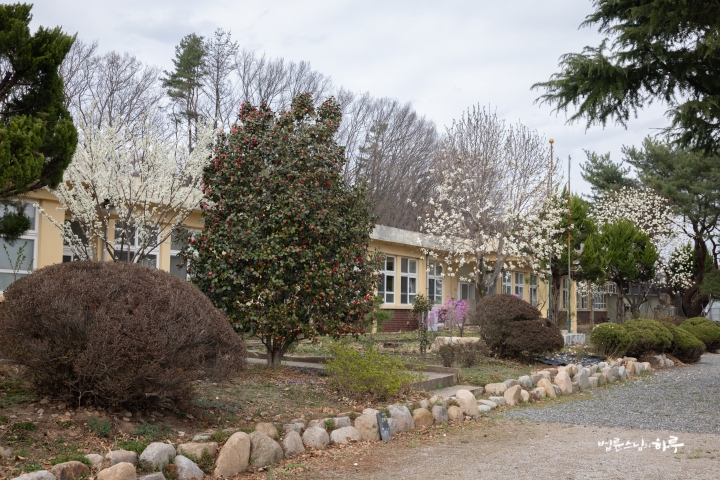
After completing his morning practice and meditation, Sunim changed into work clothes and headed to the upper field on the mountain. It’s a day for farm work under the spring sunshine after a long time.
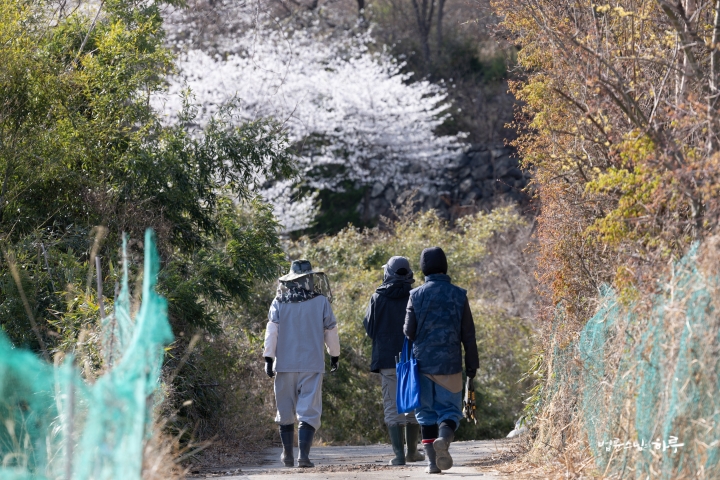
Flowers blooming everywhere announced the arrival of spring. Cherry blossoms lined the roads in full bloom, while forsythias, azaleas, and magnolias adorned the mountains and fields. It’s a beautiful spring day.
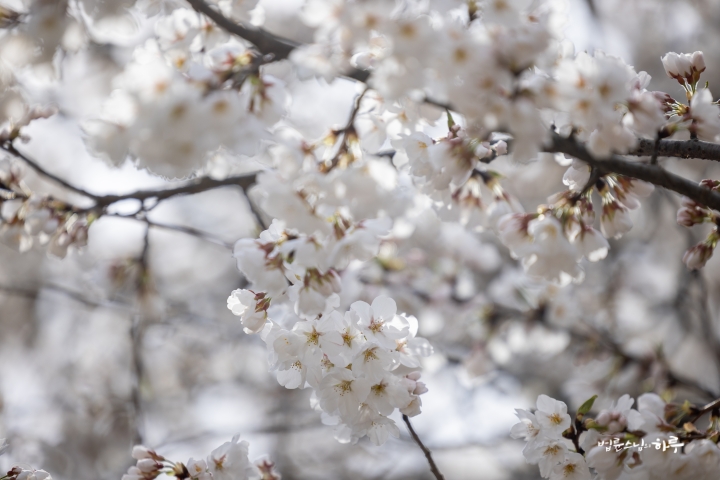
On his way up the mountain, Sunim cut a bamboo stem and quickly fashioned it into a walking stick.
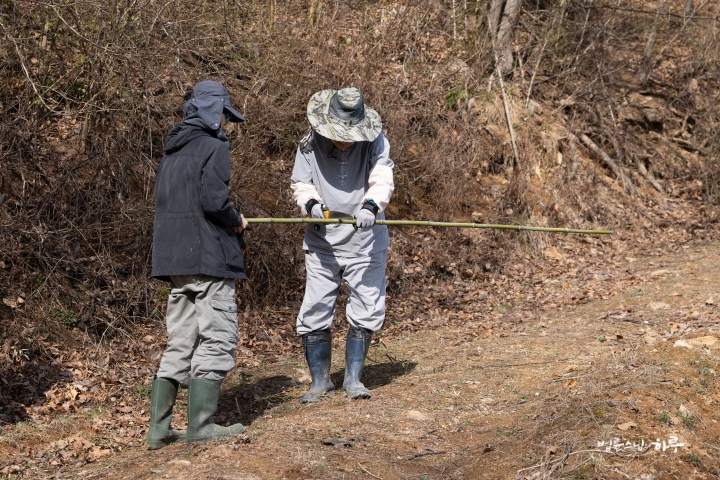
He slowly climbed the mountain path, leaning on his walking stick. Azaleas bathed in the morning sunlight greeted him.
“After such cold weather, spring has finally come.”
A smile spread across Sunim’s face.
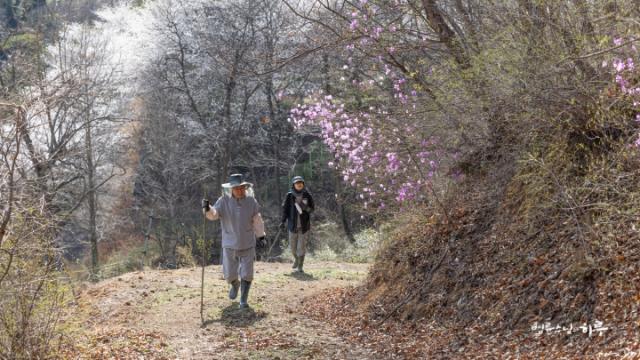
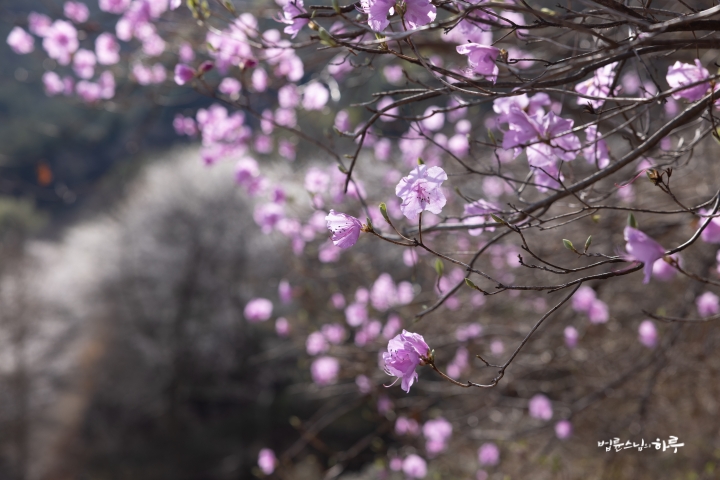
Today, Sunim planned to plant trees on the mountain with male lay practitioners. Ten men from the Daegu-Gyeongbuk and Busan-Ulsan chapters gathered early in the morning to join him. When Sunim arrived at the mountain, some practitioners were already clearing vines and small branches from overgrown areas.
“Good to see you all. You’ve all come early.”
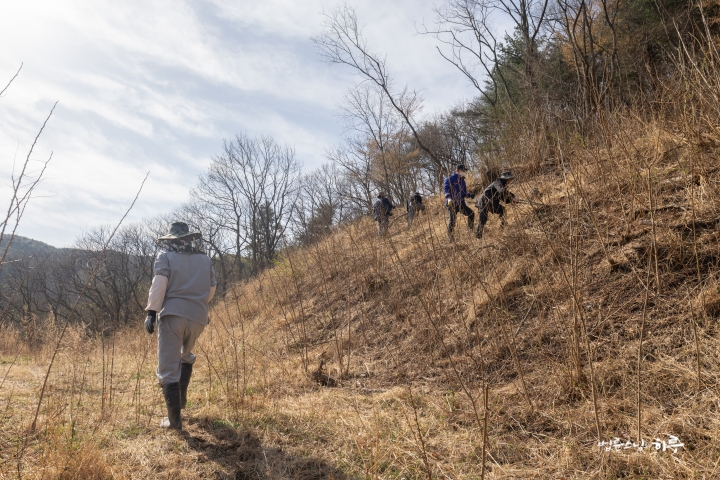
It was especially nice to see the practitioners who had planted trees together on Arbor Day last year. After greeting everyone, Sunim began planting trees.
There are seven flat areas on the mountainside. They were all once jungle-like lands covered with vines, but through the efforts of Sunim and the practitioners, they are gradually becoming fields and orchards. The lower sections, Plots 1 and 2, are being used as fields. Two years ago, about 60 trees were planted in Plot 3, and about 80 trees in Plots 4 and 5. Some trees are now blooming and sprouting. On the opposite side are Plots 1 and 2, which were newly cleared of small branches last year. They were once mulberry fields for silkworm cultivation, but when silkworm farming stopped, the fields reverted to forest and are now being reclaimed as fields.
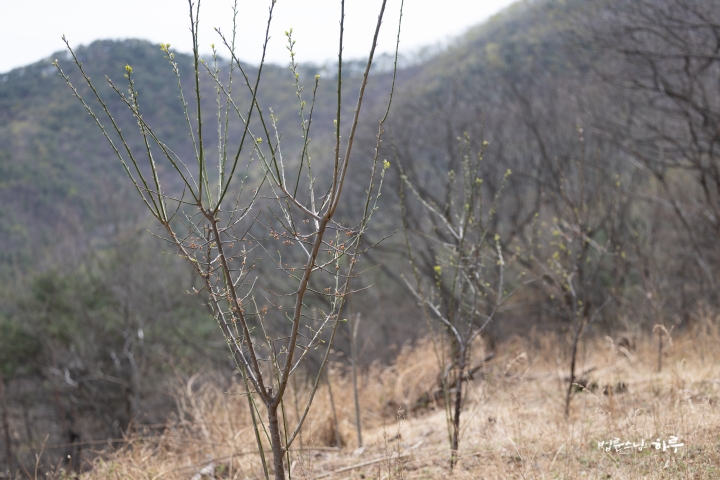
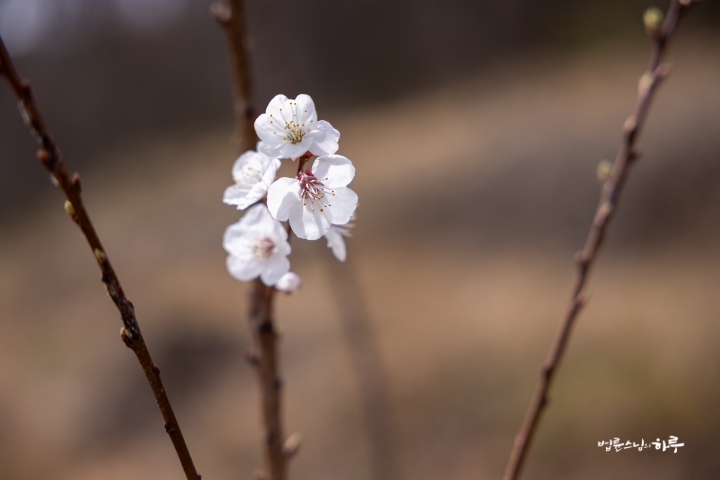
Many of the saplings planted last year had died. Sunim planted new saplings one by one to fill the empty spaces.
First, he went up to Plot 3 and planted a Japanese apricot tree. He spread the roots of the sapling carefully, positioned it upright, and filled about two-thirds of the hole with the excavated soil. Then he covered it with leaf mold gathered from the surroundings. Sunim explained how to plant trees properly.
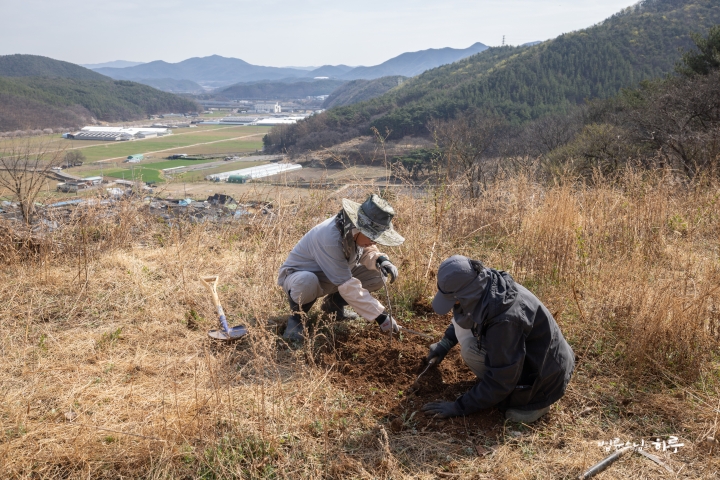
“You need to build a small mound around the tree to prevent water from pooling during rain, and make the circle wide.”
Finally, he added fine soil little by little and packed it down several times with his hands and feet.
“When packing the soil, you should slightly lift the tree while pressing down the soil.”
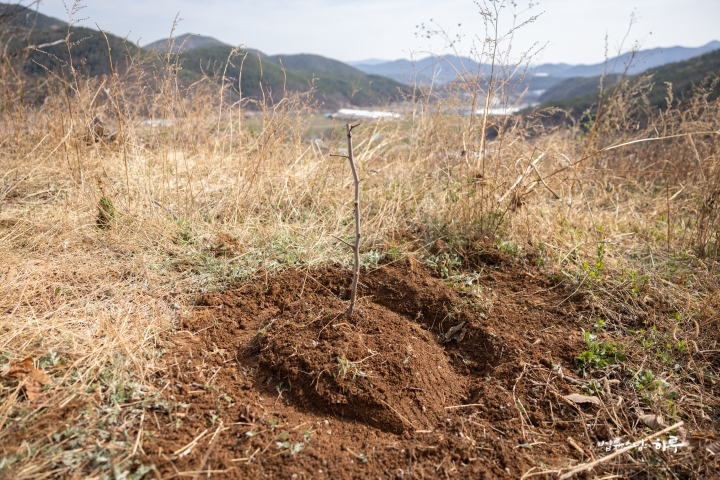
Next, he went up to Plot 4 and planted a persimmon tree.
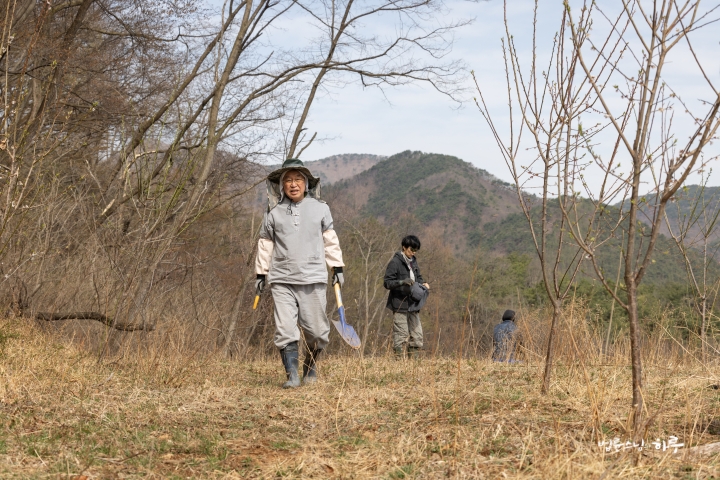
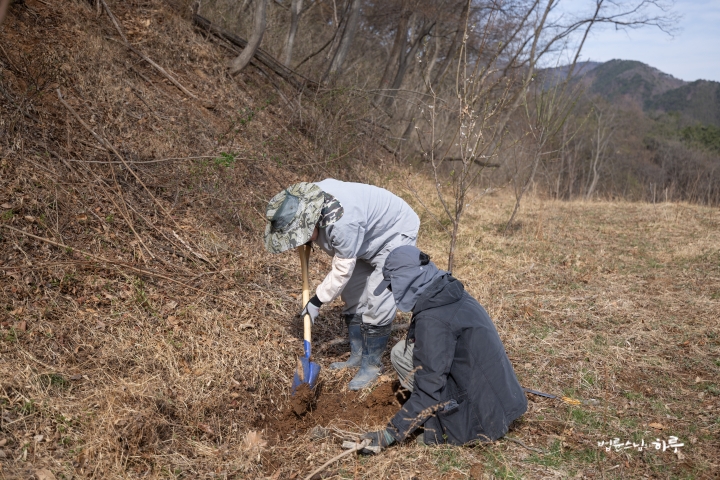
Then he climbed to Plot 5 and planted a jujube tree. Looking down from Plot 5, the cool spring breeze quickly dried the sweat on his forehead.
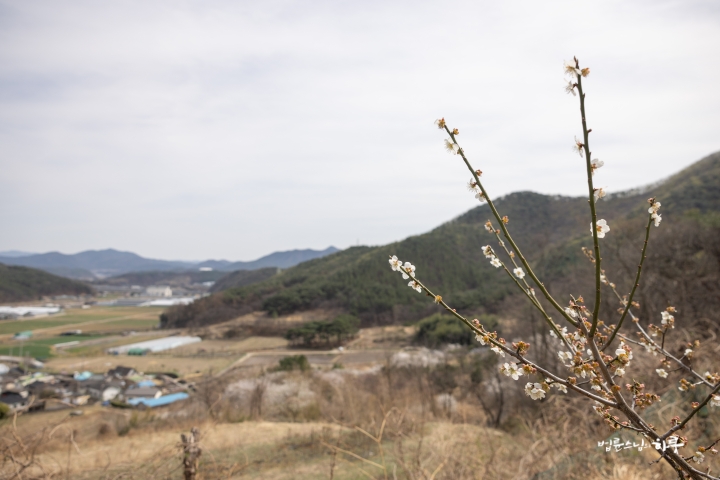
Next, Sunim went to the newly cleared Plot 2 on the right to plant more trees. The practitioners had already dug holes, making it easy to plant quickly. He planted three chestnut trees in succession.
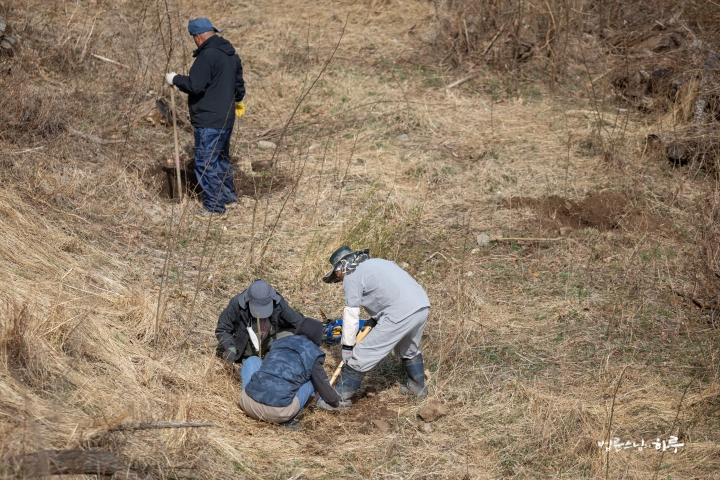
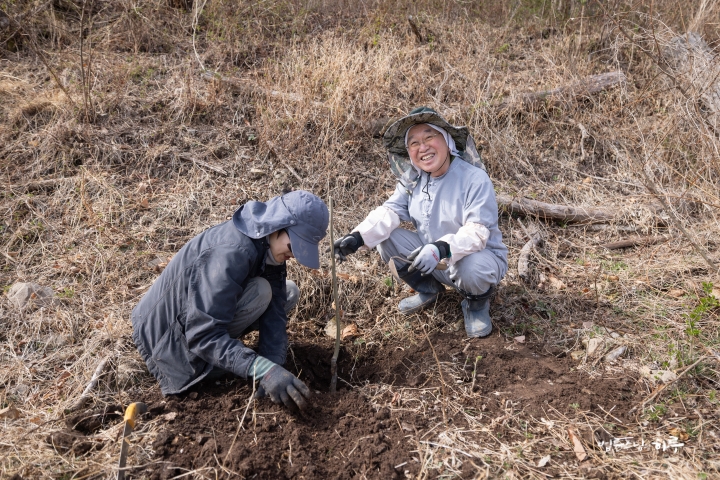
One by one, the holes were filled. Frogs awakening from hibernation hopped around, avoiding people.
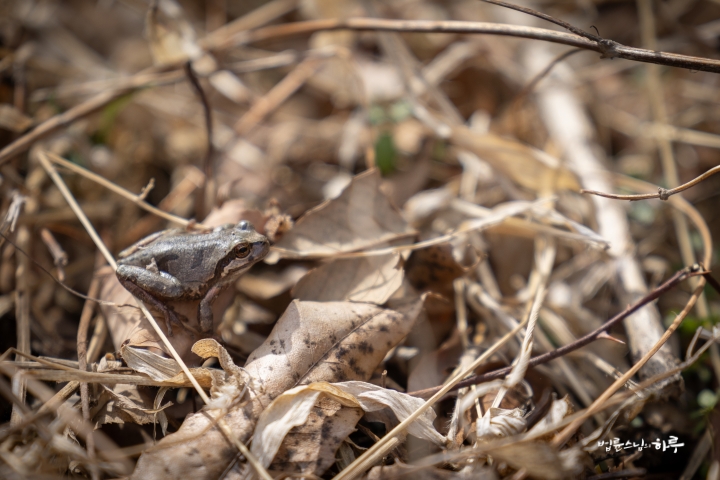
Sunim went down to Plot 1, planted a persimmon tree, and completed the tree planting. In total, ten trees were planted, including the three chestnut trees planted by the practitioners.
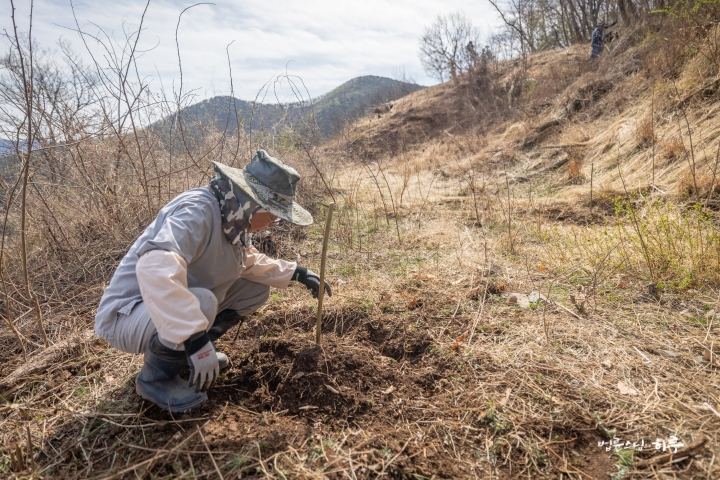
The practitioners continued clearing vines, small branches, and undergrowth. After finishing planting trees, Sunim joined them in removing the undergrowth.
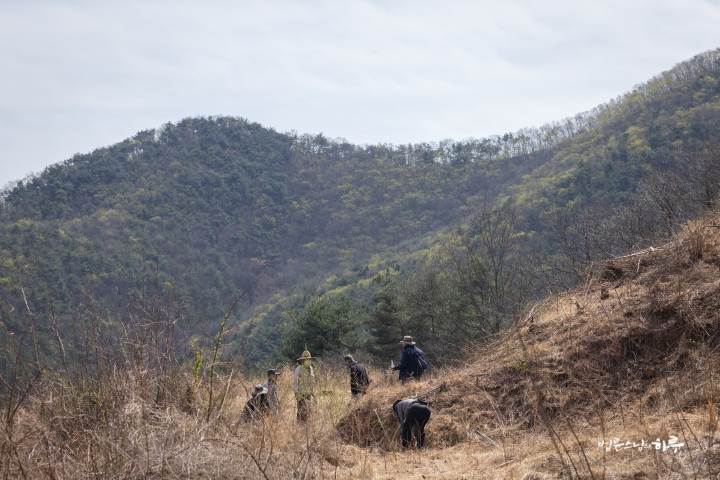
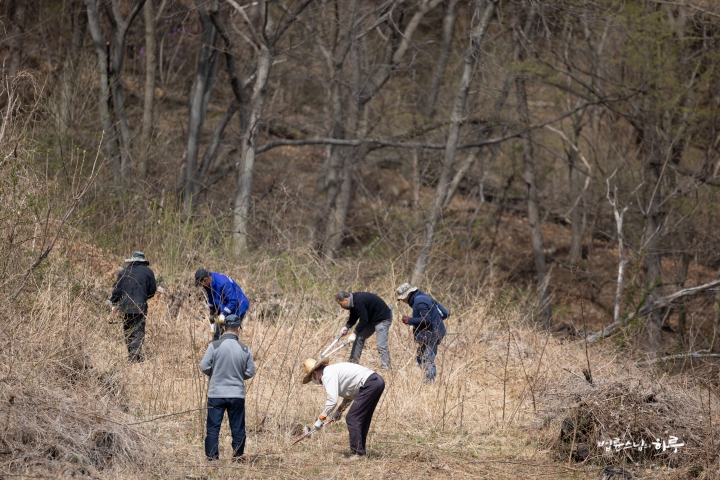
Undergrowth was sprouting up everywhere like bamboo shoots. Sunim cut down the undergrowth one by one with a sickle. There were so many small shoots sticking up like skewers that it would take a long time to cut them all with a sickle.
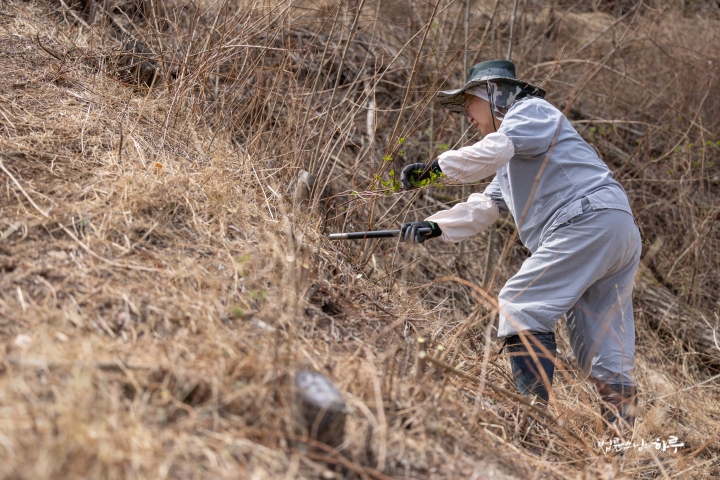
As Sunim was cutting branches with a sickle and saw, one of the practitioners handed him an electric cutting tool.
“Sunim, try this. You can cut faster.”
Using the electric tool made the work easier and the pace quickened.
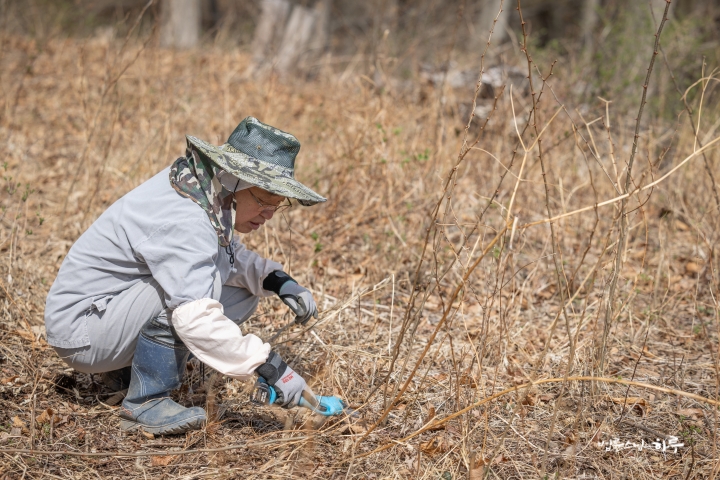
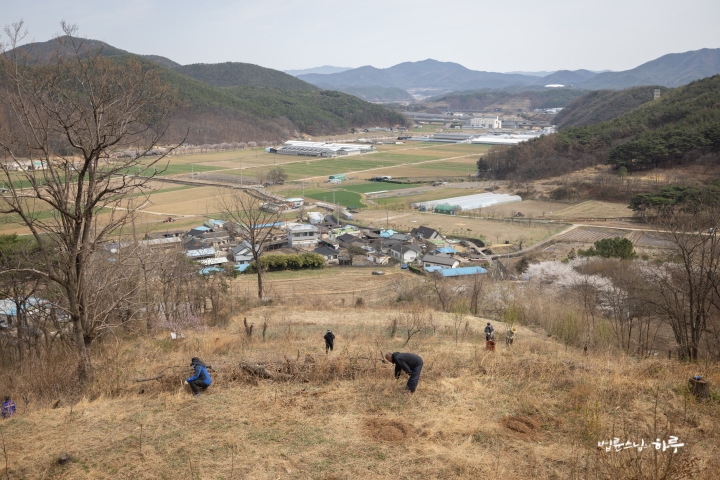
With many people working together, the abundant undergrowth disappeared quickly. They took a short break to have a snack. After eating, they regained their strength and resumed their communal work.
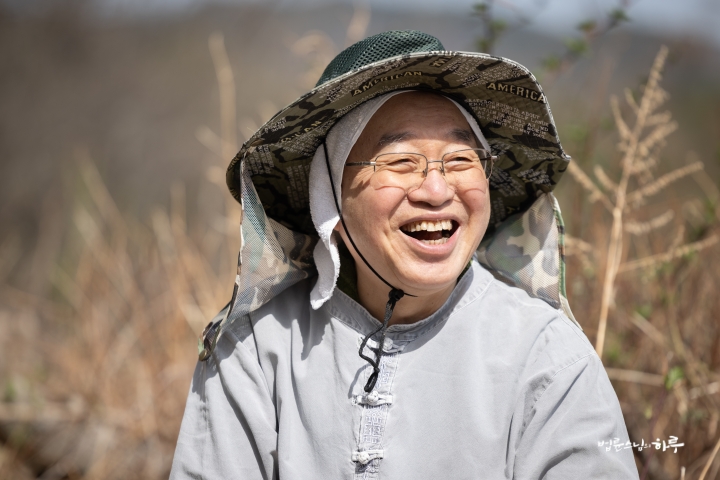
While cutting branches, they discovered various wild vegetables growing naturally in the mountains, such as fatsia shoots, acanthopanax, kalopanax, and daylily greens.
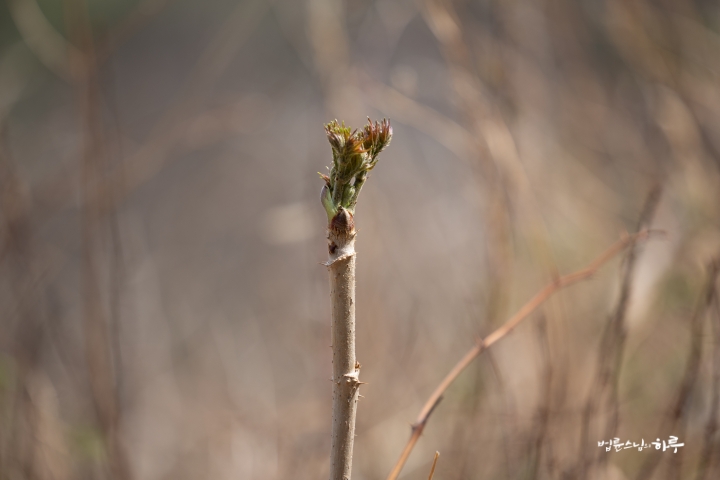
After working for a while, Sunim suddenly began to shape a thin cut branch. He peeled the bark, trimmed the opening, and made a hole.
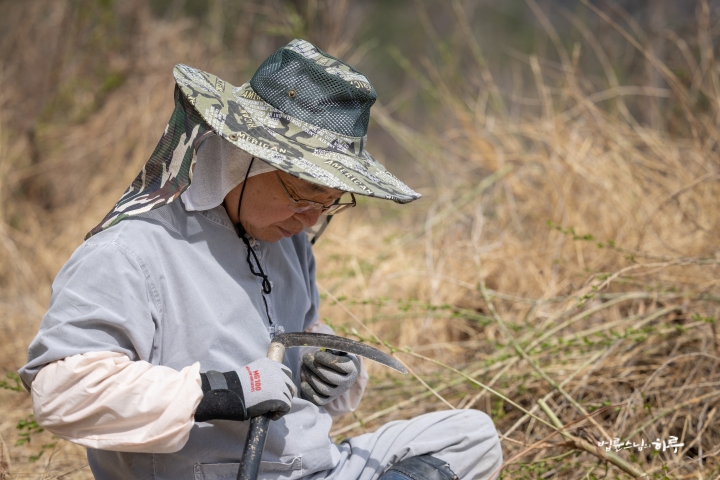
He took a deep breath and blew, producing a deep sound. Sunim made three different flutes of varying sizes. The pitch varied according to the thickness of the branch.
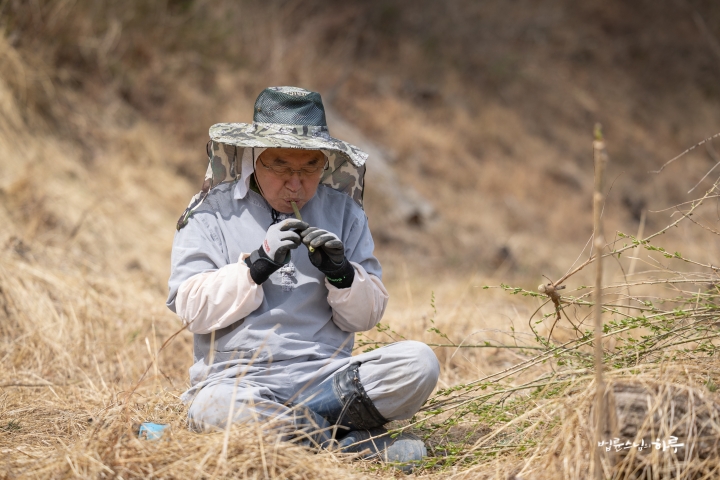
The playful flute sounds drifted through the forest. For a moment, even those working looked up and smiled.
There were also places where fallen trees blocked the path. As they finished their work, Sunim and the practitioners all worked together to move the fallen trees aside, clear the vines, and restore the original path.
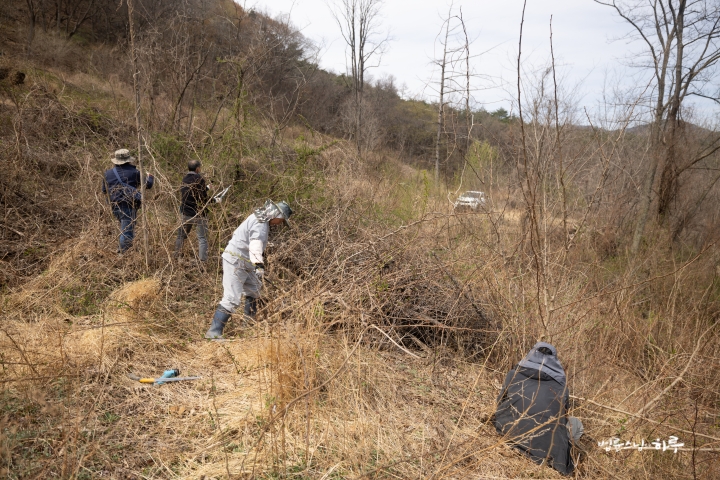
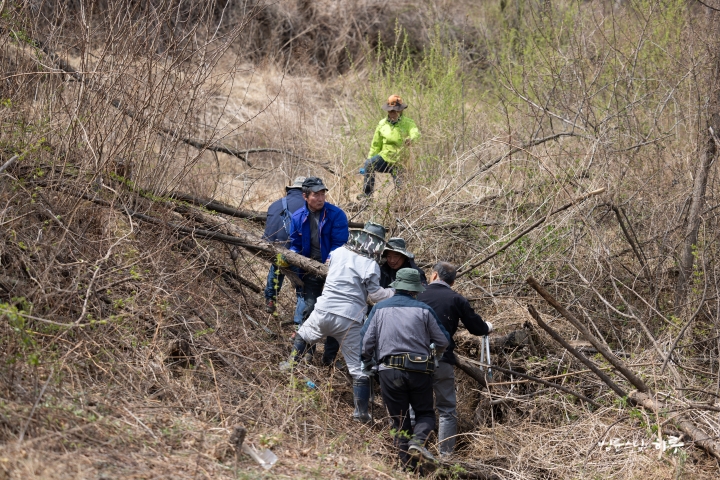
The path emerged clearly through the dense undergrowth.
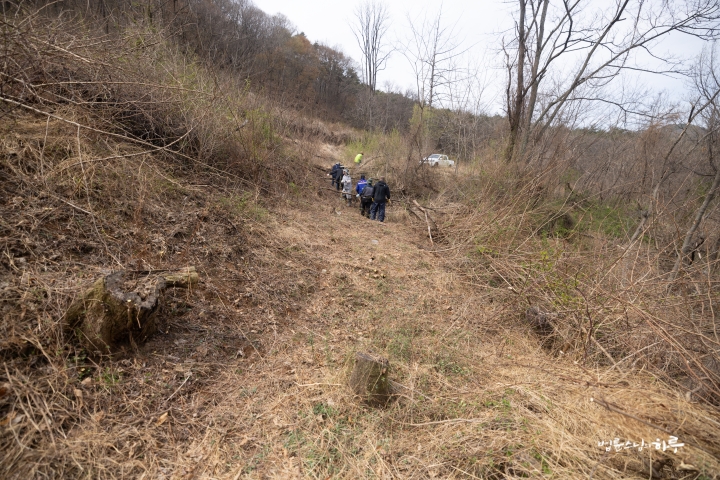
“Okay, let’s wrap things up and go.”
After gathering the tools, they came down the mountain and had a moment of mindful sharing under a beautifully blooming peach tree. Each person took turns to briefly share what they felt while working together today.
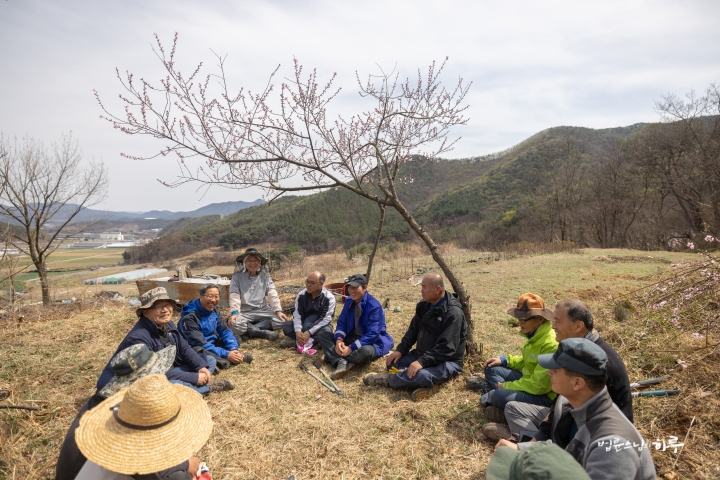
“I was glad to see Sunim visiting Dubuk Retreat Center for the first time this year. Working together in this fresh air made me even happier.”
“It was an honor to work with Sunim today, and I feel great seeing how clear the orchard looks after we finished.”
“While planting trees, I thought a lot about those who are working hard to extinguish forest fires. We need to plant and nurture as many trees as have been burned.”
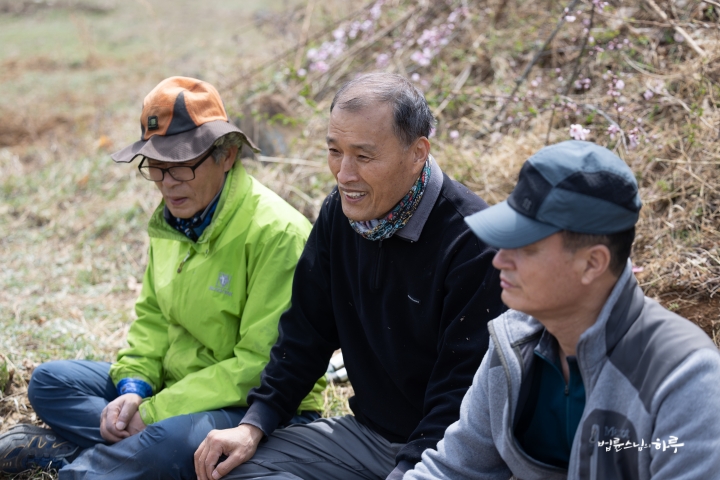
“The breeze and warm sunshine made it really pleasant to work. At first, I thought it would take days to complete this task, but with many people working together, it was done quickly. I feel refreshed now that we’ve finished.”
“Since I was also here when we planted the trees, coming back today to tend to them made me feel even better.”
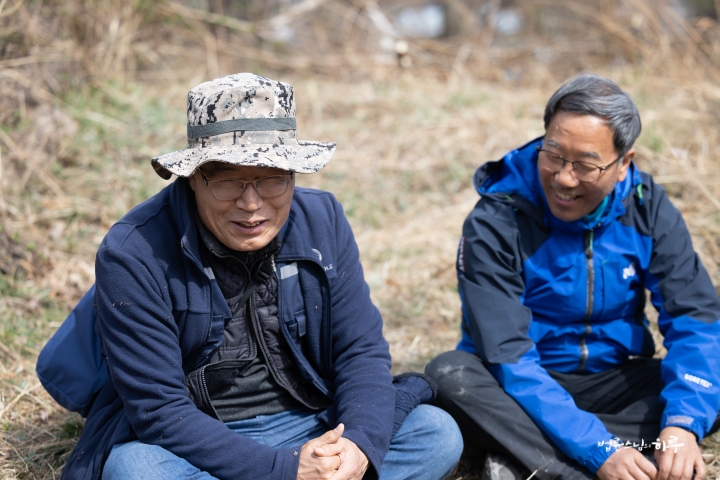
Everyone showed bright smiles, saying they had a good time in the fresh air. Finally, Sunim also shared his thoughts.
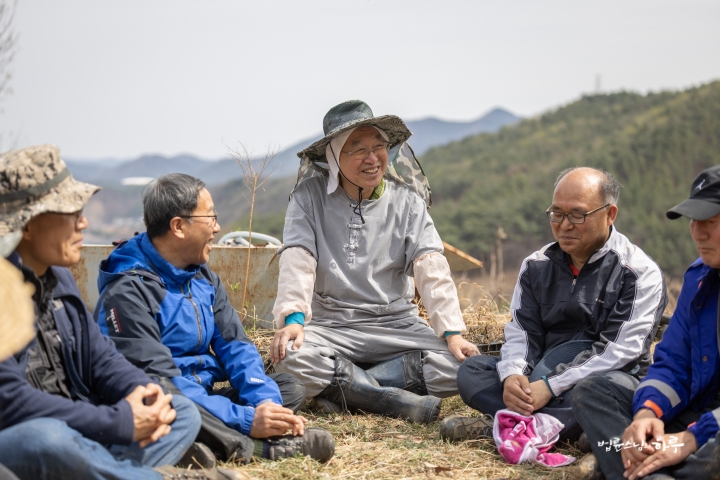
“I think it’s been almost four months since I last came to Dubuk Retreat Center. I was trying not to schedule anything because of the 100-Day Dharma Talk, but it had been a long time since I visited Venerable Domun, so I came down to pay my respects. While I was here, I also made time for some farm work. I’m grateful that those who planted trees with me last year came again. It’s been a while since I did physical labor. I haven’t been able to do much farm work since the beginning of the year because I was traveling to Bhutan and India, so it felt really good to sweat again after so long. When I was in Seoul, it still felt like winter, but coming here, I see that spring has already arrived. It was wonderful to feel that spring has come.”
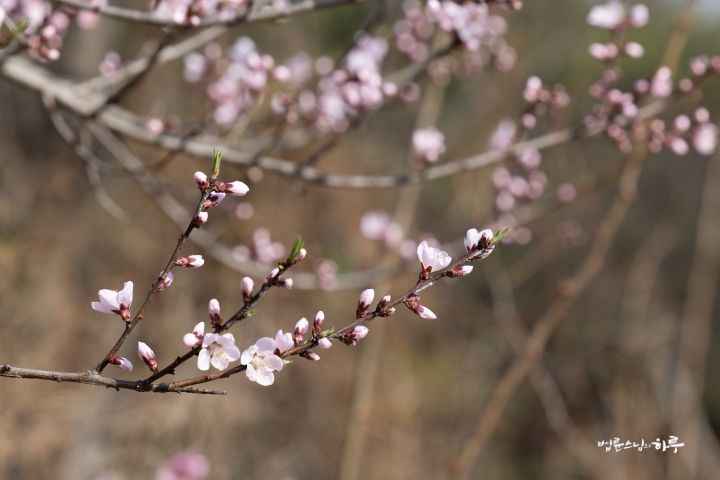
After taking a commemorative photo, the tree planting work was completed.
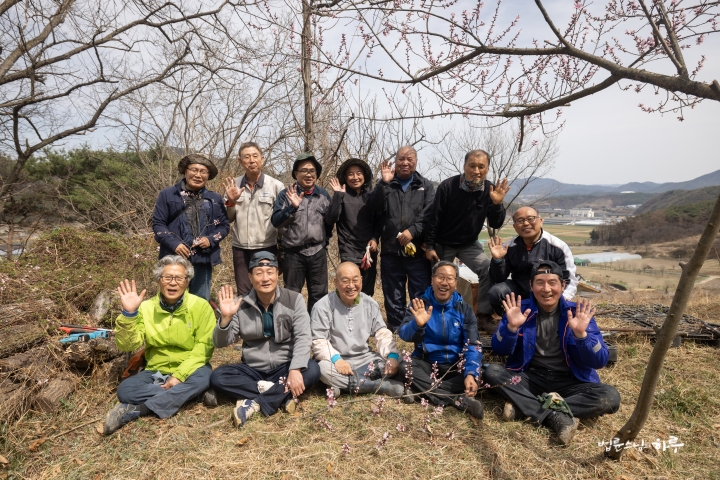
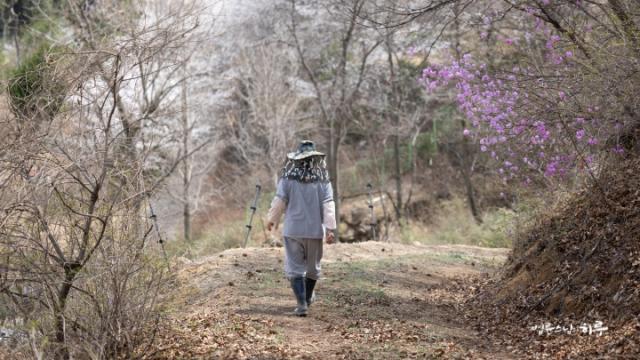
After lunch, Sunim toured the Dubuk Jungto Retreat Center. The Sharing & Emptying Yard Sale had been held in the morning, and volunteers were cleaning up.
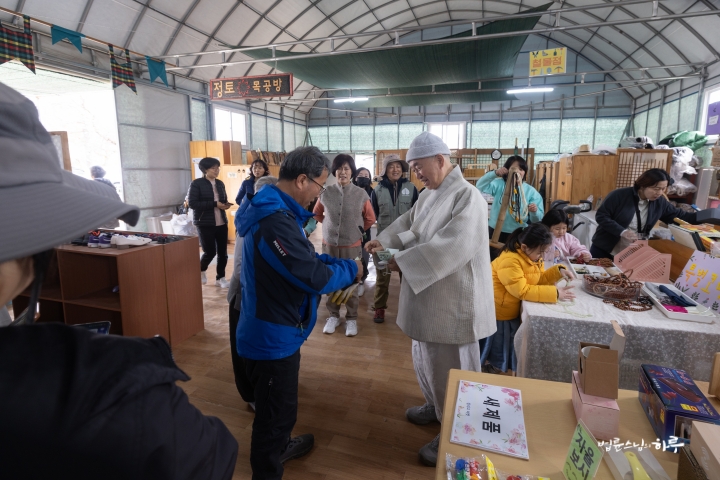
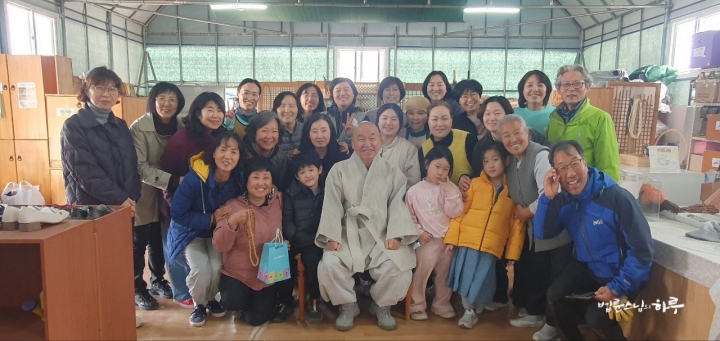
Sunim took commemorative photos with the volunteers and toured the farming fields inside and outside the retreat center.
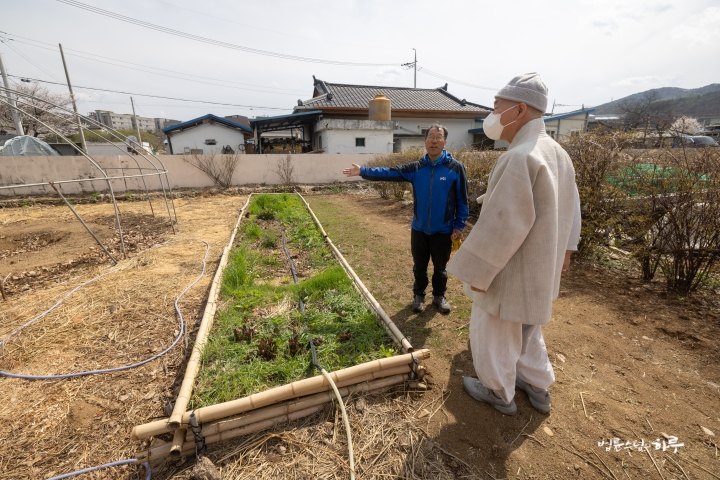
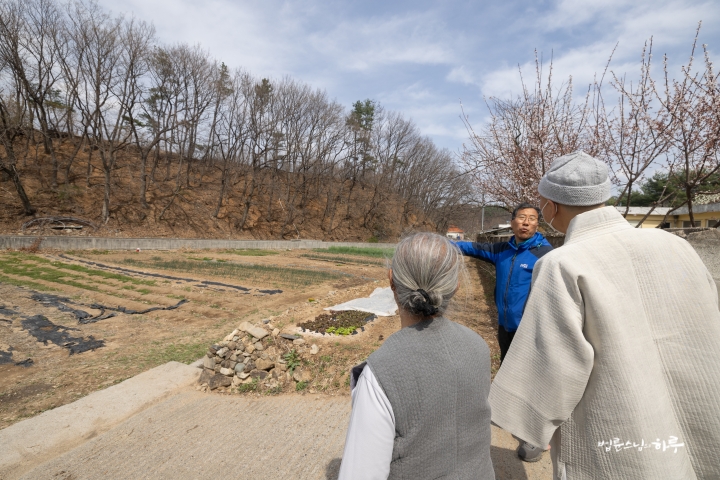
At 2:30 PM, Sunim headed to Busan to visit his master, the Great Venerable Bulsimdomun.

After traveling by car, Sunim arrived at Jungsangsa Temple, where the Great Venerable was staying, at 4 PM. Sunim first greeted him with three bows. The Great Venerable recited the Three Refuges in Pali.
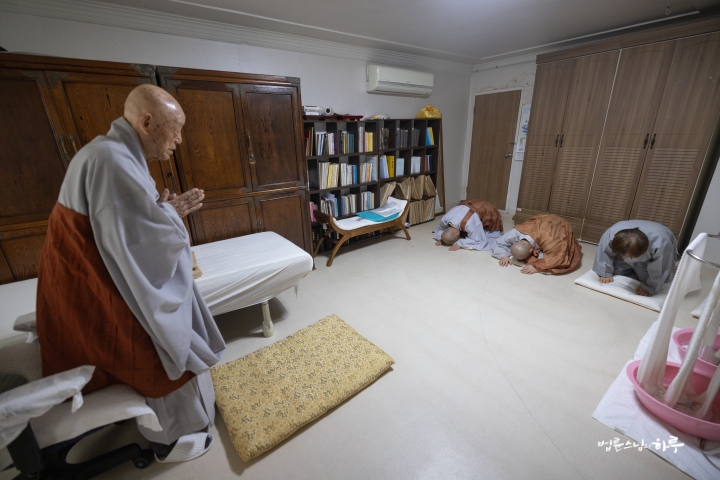
After the three bows, the Great Venerable shared some words. Sunim asked the Great Venerable to stay healthy and live a long life.
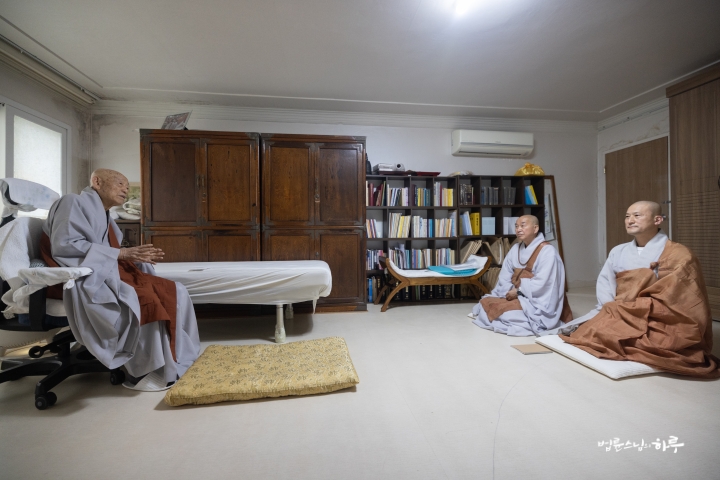
“Oh my, no one is as busy as Venerable Pomnyun, so I’m sorry to have you take time to visit a useless old man like me. You don’t need to come pay your respects to me. Giving Dharma talks around the world is how you pay respect to Master Domun. Even though it’s time for me to move on, my life keeps getting extended, and I feel like I’m becoming a burden to you.”
“Not at all. We are spreading the Dharma you’ve passed on not only in Korea but throughout the world. We’re also building a new Yongseong Memorial Hall at Jukrim Temple that you established. We’re preparing to restore Cheollyongsa Temple as well. So if you want to see Cheollyongsa fully restored, you’ll need to extend your life a bit longer.”
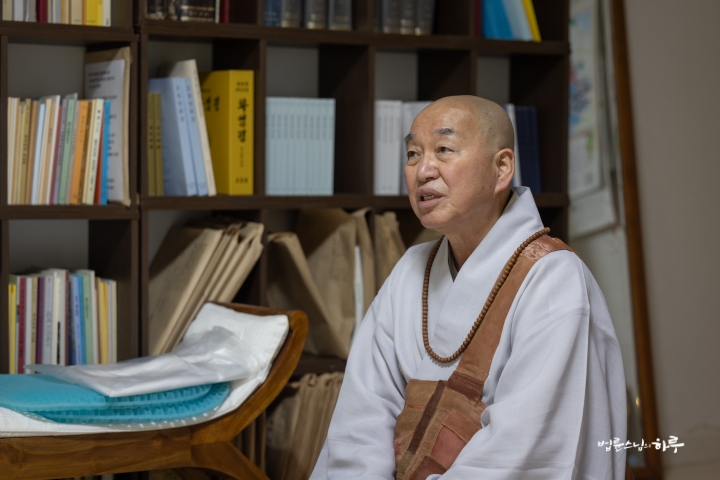
“Oh, I feel sorry because I keep receiving from you. I sent other disciples to study abroad, but I couldn’t do that for you, and yet you’ve done so much for me. I spent all my money buying land at sacred sites while trying to fulfill Master Yongseong’s dying wishes. What I regret most now is that I should have bought only half the land and given the rest of the money to you, but I couldn’t do that.”
“It was wise to buy that land. Even with money, we couldn’t buy that land now. When parents are young, they help their children, but when the children grow up, the children help their parents—who expects parents to keep helping grown children? So please just take good care of yourself. We’ll handle the remaining sacred site restoration work.”
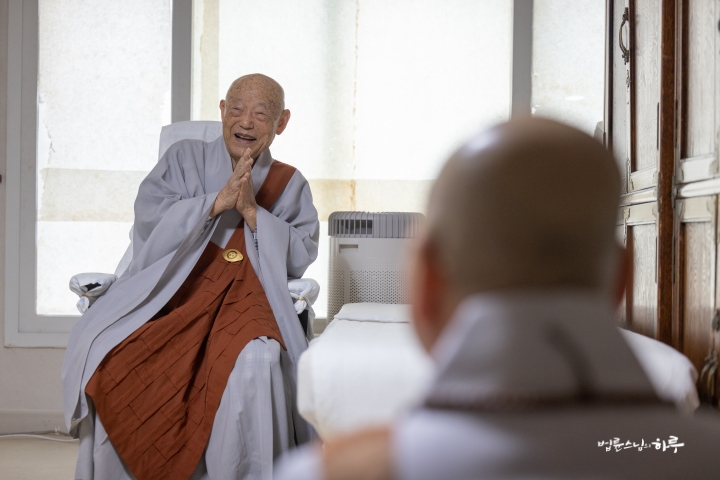
The Great Venerable seemed to be in slightly better health than before. He spoke with a resonant voice as he handed over a bundle of documents.
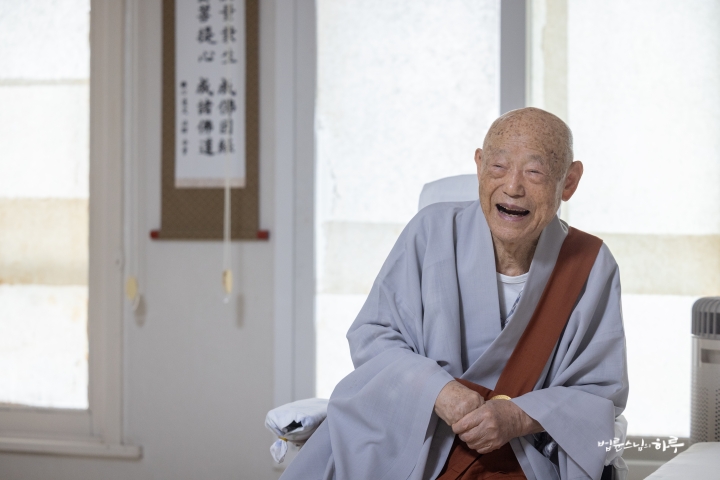
“When Master Yongseong established the provisional government in Shanghai, he prepared and provided all the necessary funds. I was recently interviewed about this. Master Yongseong played a significant role not only in funding the March 1st Movement and independence movements at home and abroad but also in establishing the Shanghai Provisional Government. I’ll share these documents with you now, so please be sure to read them.”
Sunim talked about facts that had recently come to light.
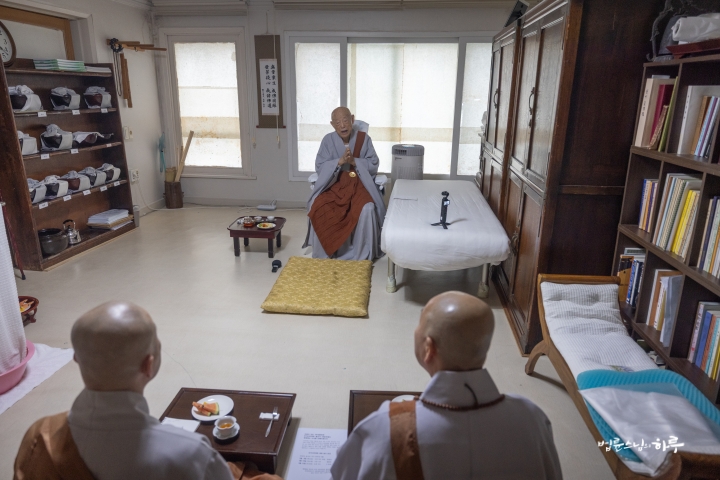
“Recently, a KBS producer went to Japan and examined all the records of Yun Bong-gil’s trial. Among them, they discovered a new record where he was asked, ‘What is your religion?’ and he answered, ‘Buddhism.’ This confirms what you’ve always emphasized—that Patriot Yun Bong-gil received the Three Refuges and Five Precepts from Master Yongseong. So from now on, you can confidently speak about this fact.”
“Thank you.”
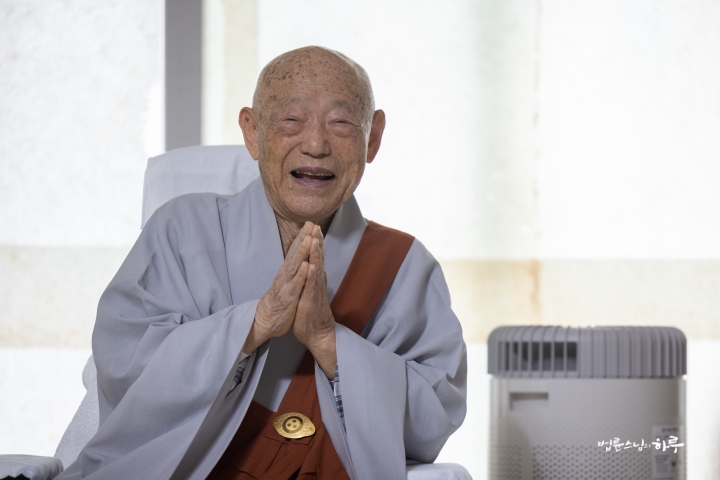
After much conversation, Sunim bid farewell to the Great Venerable and left Jungsangsa Temple.
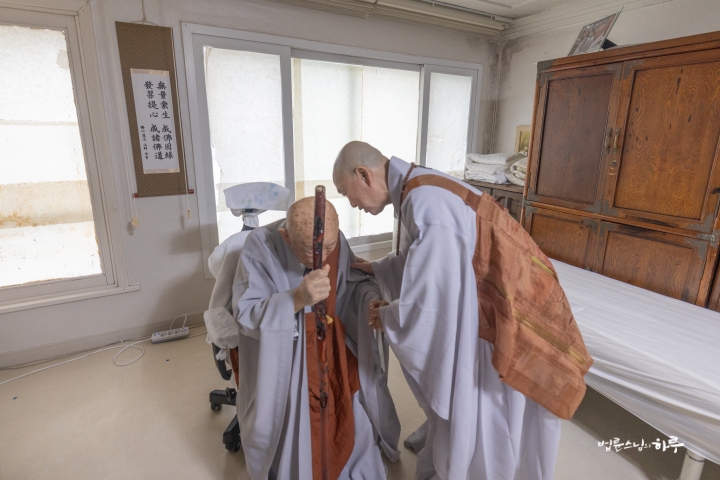
Returning by car, Sunim arrived at Dubuk Retreat Center at 6 PM.

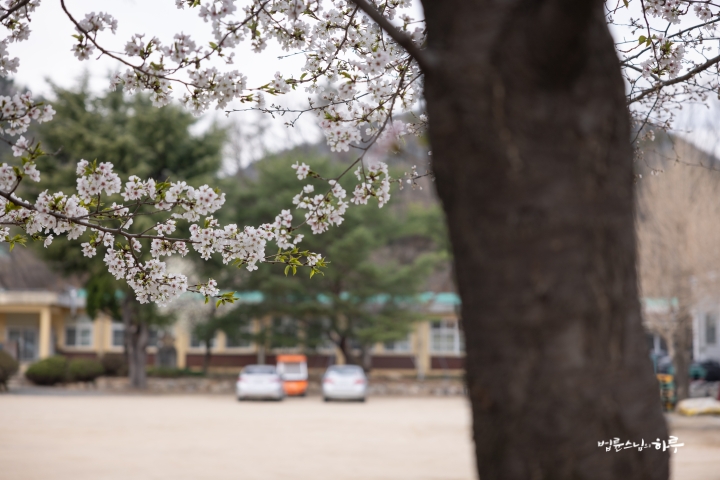
As the sun set, after dinner, Sunim took the trainees for an evening walk in downtown Gyeongju.
“We came at just the right time. The cherry blossoms are in full bloom in Gyeongju, so let’s take a short walk.”
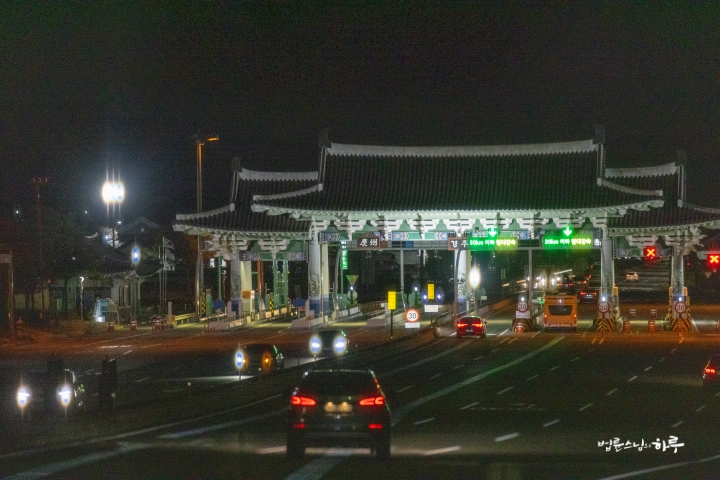
First, they headed to General Kim Yu-sin’s tomb. Heungmu Road, which leads to the tomb, was already lined with cherry blossoms forming a tunnel, drawing exclamations of admiration throughout the drive. As one of Gyeongju’s most famous cherry blossom spots, spring colors painted the entire path.
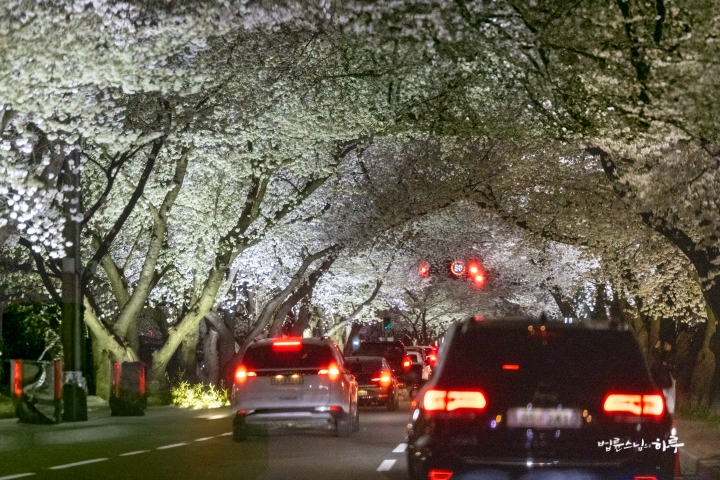
Next, they went to King Michu’s tomb. Massive cherry trees rising above the walls were blooming like white popcorn. As the wind blew, petals scattered through the air, creating a feeling as if time itself had momentarily stopped.
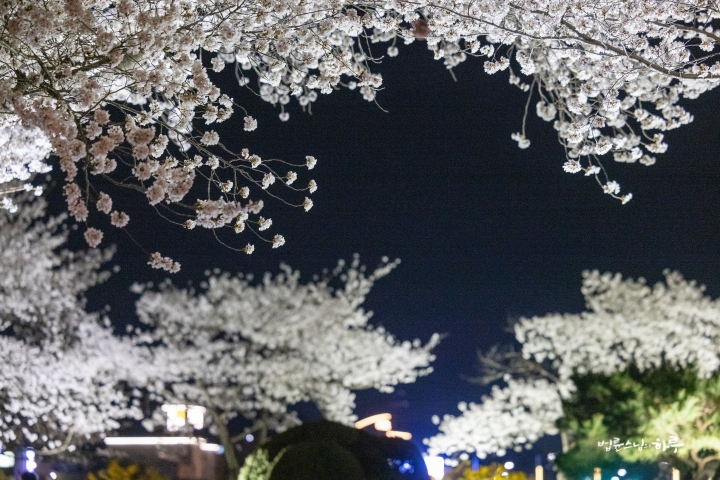
Finally, they visited Bomun Tourist Complex. Here too, cherry blossoms were in full bloom, with flowers profusely lining the roads, marking the peak of spring. The white cherry blossoms seemed to brighten their hearts as well.
“Did you enjoy the sightseeing today?”
“Yes, thank you.”
After about an hour of walking, they returned to Dubuk Retreat Center.
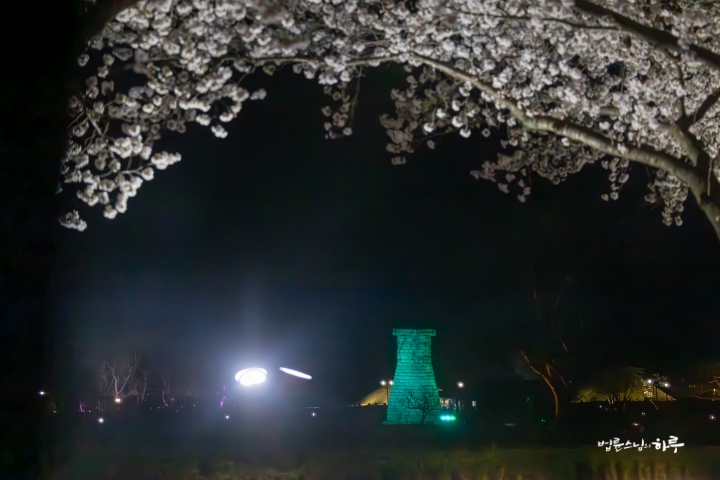
Tomorrow, Sunim plans to work on the farm in the morning, visit an elderly villager who is ill in the afternoon, and then travel to Seoul in the evening.
Since there was no Dharma talk today, we will conclude by sharing a conversation between Sunim and a questioner from the Friday Dharma Q&A session held at the Jungto Social and Cultural Center on the 28th.
I Always Feel Uneasy After Making a Choice. How Can I Overcome Decision Paralysis?
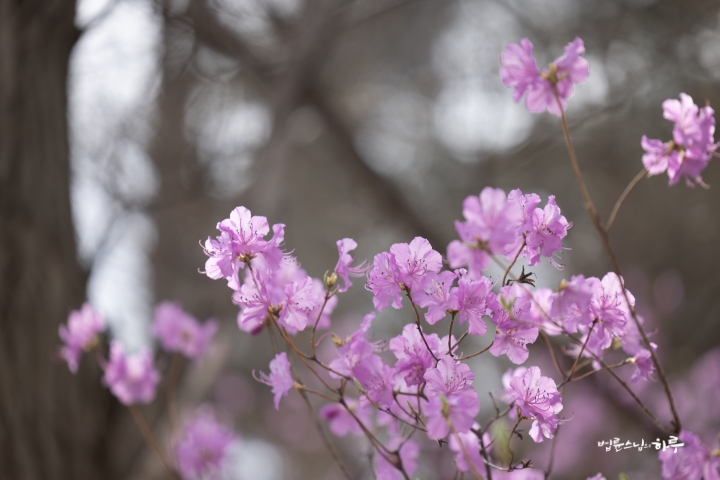
“Since you anticipated that I might scold you, I’d better not. (Laughter) This isn’t actually a problem of choice. To be direct, you’re being too calculating. You’re weighing too many small benefits when considering ‘Is this better? Is that better?’ For example, let’s say you went to a fish market. If you had gone just to buy fish and there were only fish available, you would have bought it without any inner conflict. But when you arrive and see squid, clams, and other seafood you like, it becomes difficult. You don’t have enough money to buy everything, but when you try to choose just one, everything looks delicious. That’s the state you’re in. The root of this overthinking is greed.
Another reason is that you’re trying to avoid taking responsibility for the consequences of your choices. When you’re debating whether to borrow money or not, if you borrow it, you’ll have to repay it. If you don’t want to repay it, then don’t borrow it. But not borrowing means living with financial constraints, while borrowing means worrying about repayment later. That’s why you hesitate. If you decide to borrow money, you should be willing to repay it; if you don’t want to repay it, you shouldn’t borrow it even if you want to. Similarly, if you choose to buy hairtail fish, you must give up the squid; if you choose squid, you must give up the hairtail. This isn’t unique to you—everyone experiences this. Even when we go to a Chinese restaurant to eat something as common as jajangmyeon (black bean noodles) or jjamppong (spicy seafood noodle soup), we face the same dilemma. If you choose jjamppong, you miss out on jajangmyeon, and vice versa. That’s why someone created jjamjjamyeon, with jjamppong on one side of the bowl and jajangmyeon on the other. Someone understood this human psychology and came up with this idea.
Like this, you’re always being greedy. You’re trying to maximize efficiency—putting in minimal effort while achieving maximum results. While it’s good to work efficiently, overthinking leads to decision paralysis.
To solve your problem, you need to practice being aware of this tendency and learn to make choices and take responsibility for them. There’s no inherently good or bad choice. If you find it difficult to choose between the 100-Day Dharma Talk and getting a job, just flip a coin and go with the result. If you get hired, you won’t be able to attend the Dharma talks; if you don’t get hired, you can attend them.
Usually, after submitting a job application, people fear rejection. But in this case, with the 100-Day Dharma Talk available, your situation is actually quite favorable. If you get the job after applying, you can start working; if not, you can attend the Dharma talks. So the Dharma talks aren’t a source of anxiety but rather a condition that can bring peace of mind. Some people even quit their jobs to attend the 100-Day Dharma Talk, but in your case, you can attend if you don’t get hired. It’s like finding a pearl oyster after accidentally falling into the sea. Some people deliberately jump into the sea, but you’d be collecting pearls after an unexpected fall. This is what practice is about.
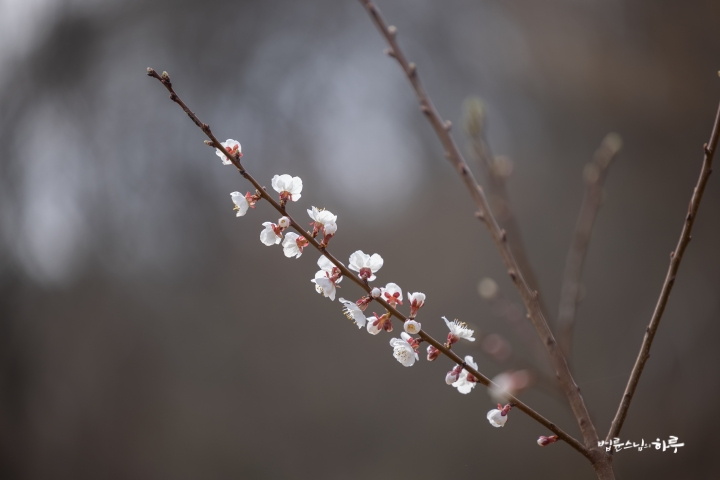
There’s an old saying, “Hardship in youth is worth buying.” Hardship is worth experiencing even if you have to pay for it, so there’s no need to fear difficulties when they arise. Instead, think, “Great! I’m getting to experience hardship without even having to pay for it!” This is the attitude of actively accepting your circumstances. In Buddhist terms, this is called “隨處作主,” which means taking ownership wherever you find yourself. When you go to a temple, you take ownership as a practitioner; when you go to work, you take ownership as an employee. Wherever you go, you don’t adopt the attitude of a guest or spectator but take ownership of your role. Another way to express this is “turning manure into fertilizer.” Rather than seeing manure as something merely to be discarded, you view it from the perspective of “This is fertilizer!” Nothing is inherently defined as “manure,” “waste,” or “fertilizer.” When manure is in your room, it’s waste; when spread in a field, it’s fertilizer. Your role is determined by your circumstances.
I suggest you first submit job applications. If you get hired, go work; if not, attend the 100-Day Dharma Talk. Don’t worry about choosing between them—apply for both. If you get a job after applying, prioritize work; if not, continue with the Dharma Talk; and if you get hired while attending the talks, simply start working. Typically, we become attached: “Since I signed up for the 100-Day Dharma Talk, I must finish it even if I get a job! I can’t go!” This is incorrect thinking. You can choose whichever works out better. Then there’s nothing to worry about. Either outcome is fine. Change your perspective to: “If I get a job, that’s good because I can work; if I don’t get a job, that’s good because I can attend the Dharma Talk.
From what I can see, it seems like it might be a little difficult for you to change your perspective. As an alternative, choose one option and commit to it without hesitation. Don’t waver. When you’re torn between “Should I do this? Should I do that?” it means both options are similar. So either choice is fine. If you’re wondering, “Should I date this man or that man?” when you’re torn between two, just start dating either one. If you don’t like him, break up and date the other. If he’s already gone elsewhere, find someone else. This is better than hesitating. If you want to decide, either choose one or reject both. Constantly comparing the two will only lead to regret.”
“It seems like I keep repeating this situation as a habit.”
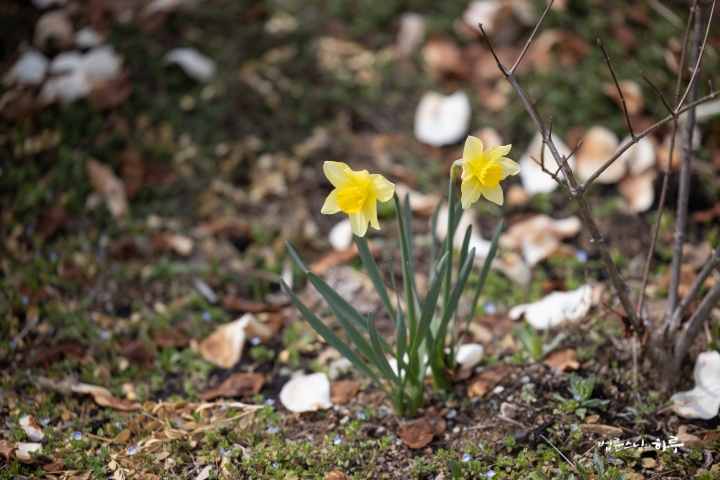
“To break this habit, try this approach: Set a specific number of times, and whenever you hesitate, immediately make a decision. Accept any resulting losses. If you do this about ten times, you’ll likely cure half the problem. By making definitive choices, you’ll realize, ‘These options are pretty similar!’ This will significantly reduce your hesitation.”
“Every time I make a decision, I feel regret or lingering attachment. Even though I tell myself, ‘I shouldn’t be like this,’ I also think, ‘I need to decide quickly.’ How should I handle these ups and downs?”
“That’s incorrect thinking. I suggested making a choice as a second-best option because you find decision-making difficult. If either option is fine, just leave it be. There’s no problem with that. In my case, I have hundreds or thousands of decisions to make, yet I often just let things be. Sometimes, an idea suddenly comes to me, and I decide, ‘Let’s do it this way!’ Other times, people around me suggest, ‘This should be done this way!’ and I make a decision based on that.
Let me give you a simple example. When you’re wondering, ‘Which of these two men should I choose?’ don’t decide—just leave it and pray. One man might naturally leave, making the decision for you, or one might become very attached to you, resolving the matter. While praying, your heart might suddenly lean toward one man. Or you might realize, ‘Neither is that special!’ So when you can’t decide, just leave it be. You seem to have an obsession that ‘I must make a decision!’ But there’s no problem with not deciding.
If the issue is that you need to make an immediate decision but can’t, then just choose one option as I mentioned earlier. If you absolutely cannot decide, it’s fine to leave it. The world is designed to resolve itself even without your decision. Questions like ‘Should I live alone or get married?’ don’t need to be decided. If you want to decide, go ahead; otherwise, it will naturally resolve itself. Some man might become attached to you, leading to marriage, or if no one does, you’ll remain single. So when you’re hesitant, just leave it be. It will naturally resolve one way or another. You don’t seem particularly wise, so why overthink? If you’re unsure, just let it be.”
“Sometimes, even when I’m living well, I get fixated on a moment from the past, thinking, ‘Why did I do that back then?’ Regret and self-blame seem to be habits of mine. I feel trapped by these thoughts without realizing it. Should I just leave this be too?”
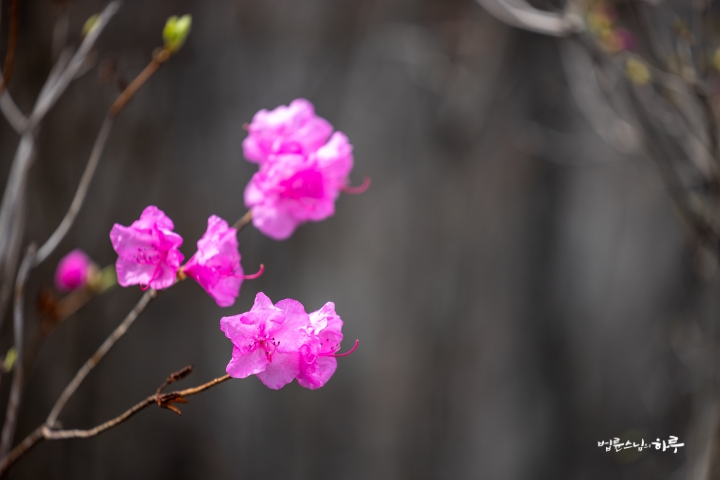
“I feel like we could talk all night and never finish. You think if you do one thing, something else becomes a problem, and vice versa. But that’s okay. Just recognize, ‘I have this lingering attachment!’ That’s all. Practice is simply about awareness. When a solution appears, then act. Just be aware: ‘I have regretful feelings now!’ That’s all. Thinking about ‘Why do I feel regret?’ isn’t the practice. That’s a matter for psychologists to research. If you dream while sleeping, just say, ‘I had such a dream!’ and leave it at that. Dreams aren’t reality. When you wake up, just think, ‘It was a dream! I almost got fooled!’ and move on. Wondering ‘What was that dream about?’ assumes there’s some truth to it. Dreams are illusory. A practitioner should simply note, ‘Oh, it was a dream!’ and end it there. If you know it’s an illusion, there’s no need to interpret it. The reason people try to interpret dreams is that they assume there’s meaning behind them. Analysis isn’t practice—it’s contemplation. Just acknowledge, ‘Ah! It was a dream!’ and let it go.”
“Thank you. I understand.”





